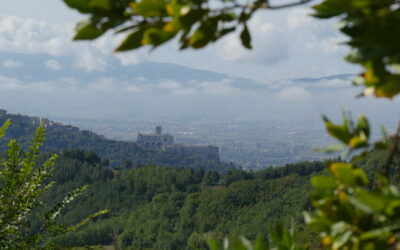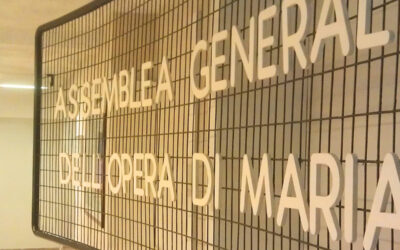“Al-Salamu Alaikum”. “Peace on You”. I am Najiyyah. I am a Muslim from Mindanao State University in Marawi, a city in the southern part of the Philippines. I met the Focolare Movement in 2006. I am convinced that whatever faith a person embraces, as long he has an inner peace instilled in him, he can light up the world. I am happy to know that I can contribute towards building a peaceful and harmonious community by starting with my self. I am teacher by profession. In school, seventy percent of the students in my class are non-Muslims, but I never make it a hindrance to create a serene, calm and a just atmosphere in the classroom. I try to love all—my students, my colleagues, and the people that I meet everyday. One time I dealt with a noisy student, who is of another faith. I felt that she was a bit harsh on me yet I kept holding back my anger. I tried to double my patience with her. I felt that I had to set aside my prejudices and to see only the good in her even as she continued to test my professional and personal competence as a young Muslim teacher. Later, after loving her concretely, she asked me if I am really a true Muslim, and I said yes. She was very amazed and she told me that I was different from the other Muslims she knew. This marked a beginning of a beautiful rapport between us. In one occasion, we were discussing the theme: “Tourism, a vehicle for peace” in class. When she was given the chance to share her thoughts, she said that peace is truly an individual’s choice and with much conviction she added that peace should really start from within. I felt an immense joy in my heart because I knew that her answer was not just an idea she had in her head, but it was a learning taken from life, an experience which we shared together. In Islam, we believe that the least we can do is not to harm another person even in our thoughts and words. I feel that if I live this aspect of my faith well, I can really contribute something to attain peace wherever I am. As a Muslim and as a teacher, it is very important for me to live my faith in a very modest way because I am aware that people are not only looking at me, but they are also learning from me; thus, I grab every opportunity that comes my way. I am a member of a youth club, which also works for peace. One of our initiatives is peer advocacy, which invites young people to stop talking about how “different” they are from the rest but instead to come together and talk about the “difference” they can make together. This encourages us to embrace others as our real brothers and sisters regardless of faith, culture, and social status. Our club also believes that there are some other ways to attain peace; thus, we came up with some other initiatives like a cleanliness drive in the school campus. Since most of us are students, we find a common free time within the week to meet and to do “clean-up” activities. We also encourage others to participate. Now, I am more and more convinced that a harmonious and healthy environment is a reflection of peace among us. Sharing my time, talents, and “treasure” is part of my commitment for peace advocacy. This must also be the reason why I was chosen to help resolve little conflicts in relationships. Being a mediator is a very big responsibility. I have to set aside my prejudices in order to listen better to the others. Almost always, I see that my personal commitment for peace and the sacrifices I make in order to achieve it, bear good fruits: problems are addressed, conflicts are resolved, and relationships are rebuilt. Through the spirituality of unity of the Focolare Movement, founded by the late Chiara Lubich, I have learned and I have experienced that peace is truly a fruit of unity. Unity has also been my person goal in building my rapport with others especially at home. As part of our culture, I grew with a deep sense of family. In fact, our house has been a home to our “extended” family members; some of them do not share our faith. Nevertheless, we have a peaceful atmosphere since we have respect for each other and that we always point out the good things we have in common rather than the things that divide us. There are also some girls who help us with the household chores. They are non-Muslims. I try to treat them as my real sisters by welcoming them in our home and letting them feel that we are really a family, after all, that is what we are—we are children of one God! They are welcome to eat with us at meal time. We invite them to join us for our family pastimes and we also encourage them to spend time with their own friends. On Sundays, we respect that it’s their worship day and we do not ask them to do household chores. We motivate them to fulfill their religious obligations. We welcome and celebrate the Christmas Season with them, too, but of course as Muslims, we remain faithful to our “Halal” when it comes to food. During Ramadhan, the month of fasting for us, Muslims, they are also invited to join us in fasting, but we have never imposed this on them. We share with them the purpose of why we fast but they have the freedom to join us or not. We don’t expect them to be wide awake at 3 in the morning when we prepare our food even if it is part of their duties at home to do so. I am happy because my mother and my sister also live the spirituality of the Focolare Movement and together, we try to build unity not only at home but also with our community. There are many occasions when we gather with our neighbors to celebrate and enjoy each others’ company. There are times that we also come together to welcome new acquaintances. With the sharing of the food, which is typical of our Maranao culture, and the playing of beautiful music through our very own ‘Kulintang’, these celebrations are always meaningful because we try to make sure that everyone is enjoying and at peace with one another—that not one will feel discriminated or out of place. I will always be grateful to Chiara Lubich. Her faithfulness to her Christian faith has moved me to best Muslim I can be. She is my inspiration to sow seeds of peace and transform the places, where I am, into fragments of unity by loving God and the neighbor concretely. I know that I can never stop the “wars” in Mindanao where I come from, but nothing can stop me from hoping and believing that one day, all shall come to pass. The road to achieving peace is long and difficult, but the journey is worthwhile because I am not alone. Yes, I have to start with myself, but it must not end there. I know that there are many young people who also want peace. If we work together, we can have better and faster means of achieving our goal. Yes, we may not live to see the day…., but we must begin! (N. A. – This experience was told at “Let’s connect”, an interreligious meeting, organized from the Focolare Movement, during the Youth Festival of the WYD 2008 in Sydney)
Be careful not to focus too much on yourself!
Be careful not to focus too much on yourself!




0 Comments